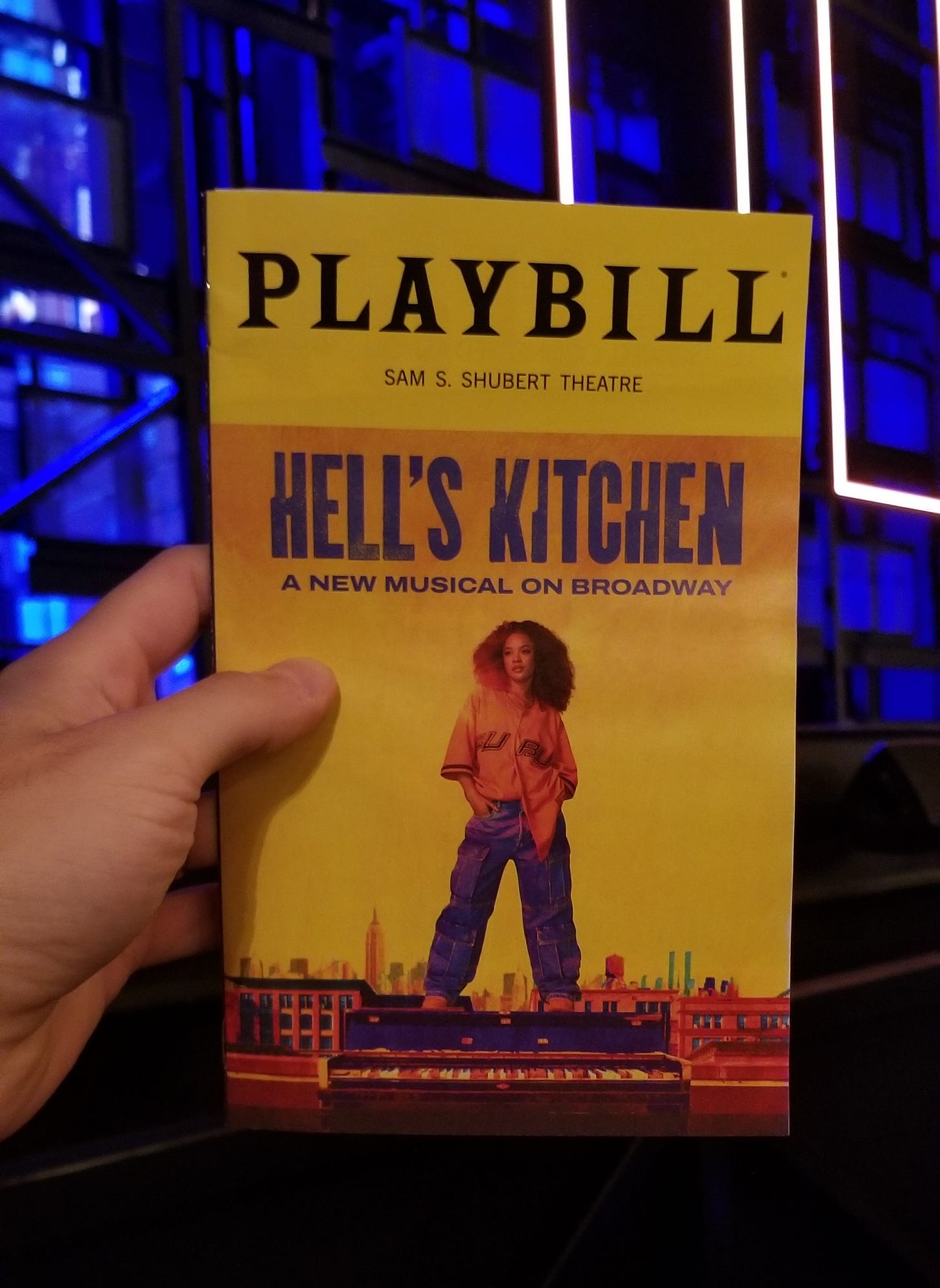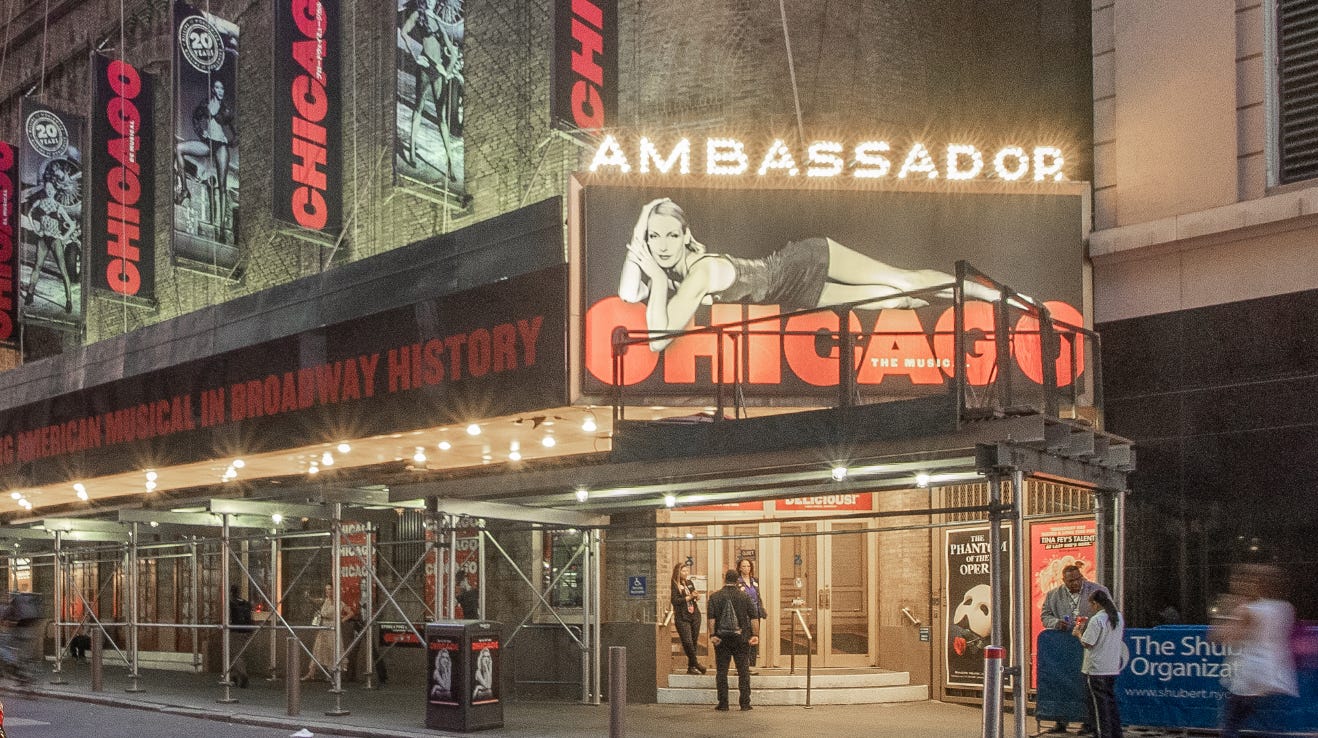The Broadway Musical Checklist
Reflections on seeing every musical currently playing on Broadway

Seeing Every Broadway Musical
After seeing Hell’s Kitchen last Thursday, I accomplished something for the fourth time since moving to New York City: seeing every musical currently playing on Broadway.
In this post, I rank all Broadway musicals playing as of this writing, along with a quick personal reflection of each one. I’ve listed them in order of most favorite to least favorite, although I’ll be the first to admit that ranking art is extremely hard to do. If I wrote this same article in a week, the shows would no doubt be ordered differently.
What Is a Broadway Musical?
Let’s start with a clarification of just what I’m ranking. For the purposes of this post, I’m using a technical definition of “Broadway.” There are thousands of theaters across the US. Only 41 of them are in Midtown Manhattan and have a contractual designation for a Broadway production. Collectively, these comprise the Broadway theaters. The name stems from them generally being along the street called Broadway. (Confusingly, one of them is named the “Broadway Theatre.”) About half of those theaters are currently host to a musical, an exact number that changes throughout the year.
Great prestige comes with a Broadway credit, but to be clear, many shows that have been on Broadway—or are perhaps on their way there—travel among theaters around the world, giving the term “Broadway musical” in practice multiple meanings. Sometimes these shows are even in gigantic theaters that hire actors who are part of the Actors’ Equity Association, potentially along with musicians, directors, stage managers, ushers, and so on, all consummate professionals and part of their respective unions, too. While you do need to physically be in New York City to see a Broadway musical, there is still top-notch theater to be found everywhere!
Ranking the Musicals
A few disclaimers before I go on trying to rank shows:
With Broadway, the bar is set absurdly high. My overall ranking of a show is not related to the quality of the performers, who are practically without exception supremely talented. The same goes for the musicians, stage designers, and crew members who must often make do with the show that is handed to them. My rankings are not attributable to any one person, as shows rely on many, many people to even be mounted in the first place. Even my least favorite shows have plenty of redeeming elements and brilliant creatives involved.
These are my personal opinions and nothing more. Part of the beauty of theater—or all art, for that matter—is its subjectivity.
Also, I encourage residents and tourists alike to take advantage of the Broadway lottery and rush system. See my article on how to see Broadway shows for cheap for details, along with other cost saving tactics. It is eminently possible to see Broadway shows for $50 or less.
With all that out of the way, here is my current ranking of every musical currently playing on Broadway.

The Best of the Best
Hamilton: There’s a reason this show is still playing on Broadway. Hip hop has a space here, and this show is a virtuosic display of how musical theater has the potential to elevate stories and turn historical figures into veritable icons.
MJ: I sometimes find myself stuck trying to defend this show to people who categorically won’t see it because of whom it’s about. So I won’t; your money, your prerogatives. It’s understandable. To those who will: the book is clever, the music is obviously superb and in some ways peerless on Broadway, and the talent among the singers and dancers is borderline shocking.
Hadestown: Such a heartbreaking, inventive take on Greek mythology, with songs and poetry as theater. I don’t think it’s without its flaws, though. My two cents: Orpheus’ song should have been implied, not sung.
Chicago: This is another show that persists on Broadway for good reason. Just put the orchestra on stage and have people dance to Bob Fosse’s choreography. Some of the characters frankly don’t need to be great singers, which has led to some wild—and occasionally genius—casting.
Brilliant Theater
The Lion King: If the show ended after “Circle of Life,” it would be worth the price of admission alone. For better or worse, however, it doesn’t. Some parts drag on for me, but as a work of both music and theater, it’s truly best in class.
& Juliet: It’s a trope within a cliché with a dash of gender nonconformity and a dollop of iambic pentameter, and I love every second of it. I’m biased, however. Britney Spears and Backstreet Boys: these are the songs of my childhood.
Cabaret: The current revival has some issues I couldn’t shake off, like the experiential Kit Kat Club feeling more gimmicky than immersive. But the nearly 60-year-old book and score ring as fresh as ever.
Six: Hamilton looms large from across the street, but Six is a success in feminism in theater, in that it is created, played, sung, and about women and nonbinary people. The songs are composed impeccably, and I love that I’m in and out in under 90 minutes.
Hell’s Kitchen: Combining the Alicia Keys catalog with new R&B-tinged numbers is, musically speaking, Broadway bliss. Not only did I get to pray at the church of Shoshana Bean, I was lucky enough to hear understudies Gianna Harris and Rema Webb go on as two of the leads.

Flawed, but Enjoyable
Suffs: This show has an excellent score and timely book. However, like Six, I find myself comparing it to the vanguard that is Hamilton, which also has a great score and book but with sharper choreography and a musical language more effective at packing in history.
The Great Gatsby: I first walked away from this show blown away by Jeremy Jordan’s silky, virtuosic voice but unsure how it matched who his character is supposed to be. And that was just Jay Gatsby; many of the characters felt out of focus in one way or another to me. The songs are its saving grace though, with this score an increasing part of my morning routine.
Moulin Rouge!: The costumes, set pieces, lights, and props are all lavish, and the songs are chosen well, making this a fun trip to the theater and a well-executed jukebox musical. But truth be told, I find a lot of Moulin Rouge! forgettable among the larger scheme of Broadway.
Wicked: This is going to be a hot take, but I think the huge spectacle, excellent dancing, and lore of the Wizard of Oz allow people to overlook a relatively lackluster book and score. When it hits, at least, it homers.
Once Upon a Mattress: The Lucille Ball-esque physical comedy is unique on Broadway, and Sutton Foster is a gem. Plus, I appreciate that this Golden Era show doesn’t play too heavily into outdated gender tropes. But music is paramount for me, and this 65-year-old score just doesn’t cut it in our current era of rap, R&B, pop, and country all elbowing into the Great White Way. While the music may not be entirely to my tastes, it is nevertheless skillfully crafted. I would be remiss in not acknowledging that this was the first Broadway musical composed by a woman—in this case, Mary Rodgers in 1959. Musical theater composition remains a male-dominated industry, but the tides have certainly been shifting. Within this list, Hadestown, & Juliet, Six, Hell’s Kitchen, Suffs, Moulin Rouge!, and The Notebook all include women and nonbinary composers.
The Notebook: I had never read the source book or seen the film. I knew there was a major twist at the end, which I had somehow never learned. I begged friends not to spoil it for me. It was in vain, however; I simply left confused, as the “twist” is made clear early in the show. Maybe this is why instead of a story of romance or sadness, I thought it was one of off-putting, unhealthy obsession?
The Rest
Aladdin: I can’t help but compare this to The Lion King, which has better Broadway-added songs, more depth to its storytelling, and seems to honor more than appropriate. There are some cool stage shenanigans happening, and the Genie is a brilliant role to see live, but this show persists because of tourists who like Disney, not because of it being peak theater.
Back to the Future: The story is a classic now, the acting is great, and some of the effects are eye-popping. However, I’ve had the hardest time warming up to this score.
The Book of Mormon: Maybe I’m just getting old and grumpy, but stereotyped Africans singing about diarrhea, bestiality, and pedophilia was never that funny to me and now feels especially outdated and unnecessary.

N/A or Other
The Outsiders: Unfortunately, I was dealing with a health issue during Act 1 and wasn’t able to pay attention. I haven’t seen it again since, so I can’t reflect on it properly.
Water for Elephants: I am currently working with the production team of Water for Elephants for a project with my employer and, because of that, will not be ranking this musical. I will say though: the circus acts are stunning.
Stereophonic: I didn’t include this show since it’s technically billed as a play, not a musical. It is filled with music, however, and if I were to rank it, would place it among the top three.
Dealing with the Loss of a Show
There is a lesson in all this, at least for me. This list is a snapshot and can change overnight, sometimes unexpectedly. I’ve heard stories of cast members learning they’re out of a job after a surprise closing date announced over social media. My critiques of a show are not directed at the performers, who are consistently among the most talented people I’ve literally ever seen and deserve to be paid properly for their work.
My critiques are rather with me, the audience member, in mind. After all, I have a right to be precious with my time, and if I haven’t seen a show once it closes, then I never will. Full stop. The show might get revived one day at a different theater and with a different cast, but I must simply accept that my time has run out for that particular production.
That, in my opinion, is part of the tough reality of living in New York City. Dealing with change. Accepting loss. Change and loss are of course everywhere; it is part of being human. Yet it feels a certain way here. Urgent, maybe. Faster. A city that never sleeps is stuck with frustratingly little time for bereavement, and sometimes that’s exactly what’s needed.


